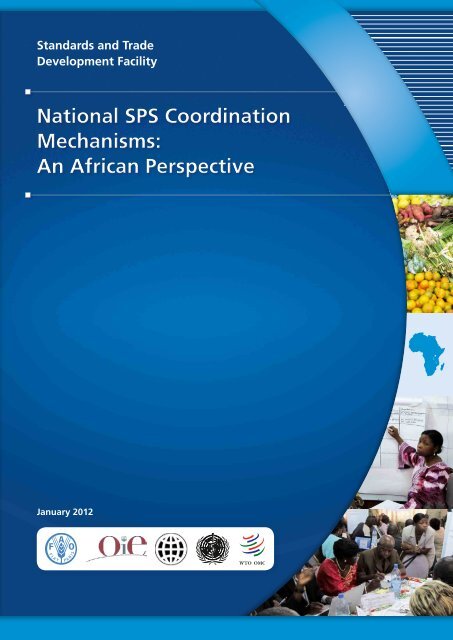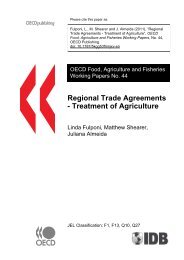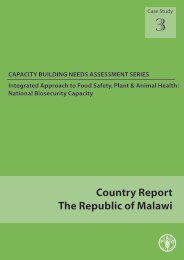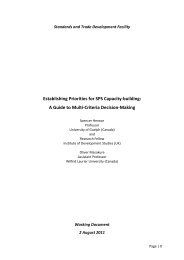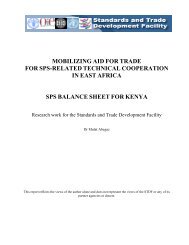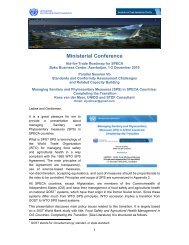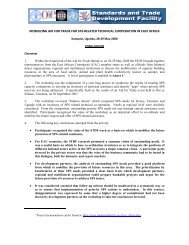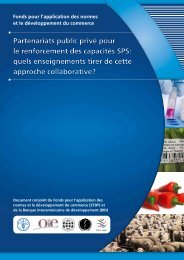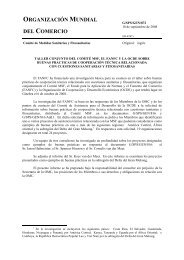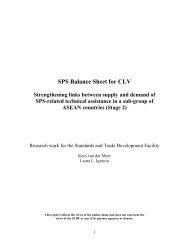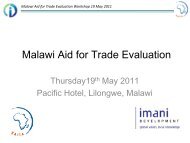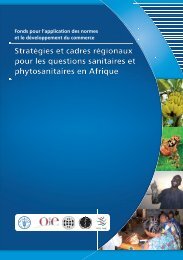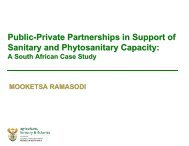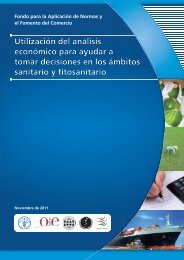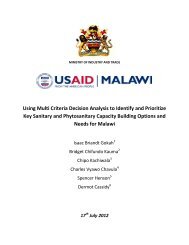National SpS Coordination Mechanisms - Standards and Trade ...
National SpS Coordination Mechanisms - Standards and Trade ...
National SpS Coordination Mechanisms - Standards and Trade ...
Create successful ePaper yourself
Turn your PDF publications into a flip-book with our unique Google optimized e-Paper software.
<strong>St<strong>and</strong>ards</strong> <strong>and</strong> <strong>Trade</strong>Development Facility<strong>National</strong> <strong>SpS</strong> <strong>Coordination</strong><strong>Mechanisms</strong>:An African perspectiveJanuary 2012
St<strong>and</strong>ard <strong>and</strong> <strong>Trade</strong> Development FacilityNATIONAL SPS COORDINATION MECHANISMS :AN AFRICAN PERSPECTIVEUlrich KleihNatural Resources InstituteUniversity of Greenwich (UK)January 2012
DisclaimerThe findings, interpretations, <strong>and</strong> conclusions expressed in this paper are entirely those of theauthors. They do not necessarily represent the view of the <strong>St<strong>and</strong>ards</strong> <strong>and</strong> <strong>Trade</strong> DevelopmentFacility (STDF) or any of its partner agencies or donors.The preliminary conclusions <strong>and</strong> recommendations in this paper were presented by the STDF atthe WTO workshop on best practices in national <strong>and</strong> regional SPS coordination for officialsresponsible for implementation of the SPS Agreement, <strong>and</strong> Codex, IPPC <strong>and</strong> OIE st<strong>and</strong>ards.Further information about this workshop, including copies of presentations delivered, isavailable on the WTO website(http://www.wto.org/english/news_e/news11_e/sps_17oct11_e.htm).For additional information, contact the <strong>St<strong>and</strong>ards</strong> <strong>and</strong> <strong>Trade</strong> Development Facility(STDFSecretariat@wto.org)ii
TABLE OF CONTENTS1. INTRODUCTION ................................................................................................................. 12. MAIN CHARACTERISTICS OF NATIONAL SPS COORDINATION MECHANISMS.................................. 32.1 Scope <strong>and</strong> functions .......................................................................................... 42.2 Composition...................................................................................................... 52.3 Structure <strong>and</strong> operation..................................................................................... 62.4 Communication................................................................................................. 82.5 Funding ............................................................................................................. 83. PRACTICAL RECOMMENDATIONS AND LESSONS LEARNED ........................................................ 103.1 Raise awareness on the importance of SPS capacity for trade <strong>and</strong>economic growth, <strong>and</strong> ensure high-level government buy-in ........................... 103.2 Clarify organizational m<strong>and</strong>ates <strong>and</strong> roles in the SPS area, based on areview <strong>and</strong> update of legislation as appropriate ............................................... 113.3 Build on existing mechanisms <strong>and</strong> encourage the active engagement ofall the concerned SPS stakeholders .................................................................. 113.4 Establish effective communication strategies, <strong>and</strong> consider the creationof web-based networks <strong>and</strong> tools. ................................................................... 123.5 Take a pro-active approach to enhance sustainability ....................................... 133.6 Use national SPS committees to promote regional SPS coherence .................... 14ANNEXES .................................................................................................................................. 15 17iii
ACRONYMSACFSAUCBRCCEN-SADCOMESADAFFDoHEACECOWASECCASEUFSCBRCGDPIGADIICAIPPCISOISSBKEPHISNCCNEPNRIOIEPAN-SPSOPIPPVSRECSADCSANASSPSSTDFTBSTBTUNIDOUSDWAEMUWTOThai <strong>National</strong> Bureau of Agricultural Commodity <strong>and</strong> Food <strong>St<strong>and</strong>ards</strong>African Union CommissionBritish Retail ConsortiumCommunity of Sahel-Saharan StatesCommon Market for Eastern <strong>and</strong> Southern AfricaDepartment of Agriculture, Forestry <strong>and</strong> FisheriesDepartment of HealthEast African CommunityEconomic Community for West African StatesEconomic Community of Central African StatesEuropean UnionFood Safety Capacity Building on Residue Control projectGross Domestic ProductInter-Governmental Authority on DevelopmentInter-American Institute for Cooperation on AgricultureInternational Plant Protection ConventionInternational Organization for St<strong>and</strong>ardisationInternational St<strong>and</strong>ard-Setting BodiesKenya Plant Health Inspectorate Service<strong>National</strong> Codex Committee<strong>National</strong> Enquiry Point (as foreseen in Annex B of the SPS Agreement)Natural Resources Institute, University of Greenwich, UKWorld Organisation for Animal HealthParticipation of African Nations in Sanitary <strong>and</strong> Phytosanitary St<strong>and</strong>ard-settingOrganizationsPesticide Initiative ProgrammePerformance, Vision, <strong>and</strong> StrategyRegional Economic CommunitySouthern African Development CommunitySouth Africa <strong>National</strong> Accreditation SystemAgreement on the Application of Sanitary <strong>and</strong> Phytosanitary Measures (WTO)<strong>St<strong>and</strong>ards</strong> <strong>and</strong> <strong>Trade</strong> Development FacilityTanzania Bureau of <strong>St<strong>and</strong>ards</strong>(Agreement on) Technical Barriers to <strong>Trade</strong> (WTO)United Nations Industrial Development OrganizationUnited States DollarWest African Economic <strong>and</strong> Monetary UnionWorld <strong>Trade</strong> Organizationiv
ACKNOWLEDGEMENTSThe author wishes to acknowledge <strong>and</strong> thank all those who have contributed to thisstudy in one way or another. In particular, thanks are due to Ms Emmanuelle Bourgois, whocarried out the questionnaire survey <strong>and</strong> initial data analysis. The author is also very grateful toall the officials who contributed their time <strong>and</strong> information for the survey <strong>and</strong> country casestudies. The study has greatly benefited from information <strong>and</strong> inputs provided by AndrewEdewa (UNIDO, Nairobi) <strong>and</strong> my colleagues at the Natural Resources Institute, Ben Bennett,Andy Graffham, Hanneke Lam <strong>and</strong> John Orchard.Last but not least, special thanks are due to the STDF team for their encouragement,expertise <strong>and</strong> assistance in preparing this study.v
1. INTRODUCTION1. Sanitary <strong>and</strong> phytosanitary (SPS) measures are, by their very nature, multidisciplinary inthat they encompass the diversity of the animal <strong>and</strong> plant health, <strong>and</strong> food safety realm. Giventhe number of public <strong>and</strong> private stakeholders involved, a growing interest is observed in settingup regional <strong>and</strong> national mechanisms to better coordinate <strong>and</strong> consult on SPS matters.Effective coordination among relevant government institutions, as well as improved interactionbetween public <strong>and</strong> private sector stakeholders with an interest in SPS issues, is critical toreduce information gaps, minimize the overlap of activities undertaken by various agencies,address SPS issues in a cost-effective manner <strong>and</strong>, ultimately, improve the implementation bycountries of the WTO Agreement on the Application of Sanitary <strong>and</strong> Phytosanitary Measures(SPS Agreement) <strong>and</strong> their participation in international st<strong>and</strong>ard-setting bodies, i.e. the CodexAlimentarius Commission (Codex), the World Organisation for Animal Health (OIE) <strong>and</strong> theInternational Plant Protection Convention (IPPC). Effective coordination on SPS issuesstrengthens SPS control systems <strong>and</strong> better equips countries to control SPS risks. As such, italso helps countries in achieving other objectives such as increasing agricultural production,enhancing food security or mitigating the negative effects of climate change.2. Calls for increased attention to strengthen SPS coordination have come from a numberof national, regional <strong>and</strong> international organizations <strong>and</strong> initiatives. Since 2009, theParticipation of African Nations in Sanitary <strong>and</strong> Phytosanitary St<strong>and</strong>ard-setting Organizations(PAN-SPSO) project carried out activities to sensitize SPS management authorities in Africa onthe importance of improved SPS coordination <strong>and</strong> provided support for the establishment <strong>and</strong>operation of national SPS committees. 1 As part of its involvement in this project, the STDFcarried out a questionnaire survey to examine the existence <strong>and</strong> functioning of national SPScoordination mechanisms in Africa. This study presents <strong>and</strong> analyses the findings of the survey.In addition, information was gathered through e-mail communication <strong>and</strong> telephone interviewsregarding experiences in other parts of the world. The objective of this study is to extractlessons learned <strong>and</strong> provide suggestions <strong>and</strong> guidance to support the further establishment <strong>and</strong>operation of national SPS coordination mechanisms in the future.3. The study complements a recent STDF publication on Regional SPS Frameworks <strong>and</strong>Strategies in Africa, which provided a preliminary analysis of the current <strong>and</strong> potential role ofthe African Union Commission (AUC) <strong>and</strong> Regional Economic Communities (RECs) in the SPSarea. 2 The report concluded that there is potential for the AUC <strong>and</strong> RECs to play a coordinatingrole in SPS issues at the regional/sub-regional level, provided the following conditions are inplace: (i) increased SPS capacity, including core SPS staff, in the AUC <strong>and</strong> RECs; (ii) high-levelnational support for the work of the AUC/RECs <strong>and</strong> commitment of national institutions toregional coordination; <strong>and</strong> (iii) clarity <strong>and</strong> consensus on SPS regional capacity needs <strong>and</strong>priorities, based on consultation with all concerned public <strong>and</strong> private stakeholders. This paper1The PAN-SPSO project aims to enhance the effective participation of African countries in thest<strong>and</strong>ard setting activities of the Codex Alimentarius Commission (Codex), the World Organisation forAnimal Health (OIE) <strong>and</strong> the International Plant Protection Convention (IPPC). Implemented by theAfrican Union Inter-African Bureau for Animal Resources (AU/IBAR), in collaboration with the AfricanUnion Inter-African Phytosanitary Council (AU/IAPSC), <strong>and</strong> financed by the European Union (EU), theproject cooperates with seven Regional Economic Communities (RECs).2Regional SPS Frameworks <strong>and</strong> Strategies in Africa. Report prepared by J. Magalhães for theSTDF at the request of the African Union Commission (AUC), July 2010. The report is available at:http://www.st<strong>and</strong>ardsfacility.org/Files/Publications/STDF_Regional_SPS_Stategies_in_Africa_EN.pdf1
will also inform another STDF study, to be published in 2012, on public-private partnerships insupport of SPS capacity. 34. The STDF encourages interested stakeholders to distribute <strong>and</strong> discuss the findingspresented in this study as a means to promote dialogue on the role <strong>and</strong> functioning of nationalSPS coordination mechanisms, <strong>and</strong> identify concrete ways to enhance their effectiveness. InOctober 2011, the STDF presented the preliminary conclusions of this study at a WTO workshopon best practices in national <strong>and</strong> regional SPS coordination for officials responsible forimplementation of the SPS Agreement, <strong>and</strong> Codex, IPPC <strong>and</strong> OIE st<strong>and</strong>ards. 4 Workshopparticipants formulated a number of recommendations to WTO members <strong>and</strong> alsorecommended that the WTO SPS Committee consider the development of guidelines onnational SPS coordination <strong>and</strong>/or a manual of good practices on SPS coordination. It is hopedthat this paper will provide useful input <strong>and</strong> guidance to any future SPS Committee work in thisarea.5. Following this short introduction, section II outlines the main characteristics of nationalSPS coordination mechanisms in Africa, based on the survey findings <strong>and</strong> other documentation.Section III provides practical suggestions <strong>and</strong> guidance for the establishment of national SPScommittees <strong>and</strong> offers lessons learned in this regard. Case studies of selected national SPScoordination mechanisms, as well as information documents related to such mechanisms, areincluded in the Annexes for reference. Annex 1 contains a useful checklist to assist in theestablishment <strong>and</strong> operation of national SPS committees. Annex 2 provides information on twoseparate tools that, among other things, support coordination <strong>and</strong> communication among SPSstakeholders at the national, regional <strong>and</strong> international level. One was developed by theNatural Resources Institute (NRI) <strong>and</strong> the other by the Inter-American Institute for Cooperationon Agriculture (IICA). Annex 3 provides case studies on national SPS coordination mechanismswith examples from Belize, Burkina Faso, Kenya, Malawi, Morocco, Namibia, South Africa,Thail<strong>and</strong> <strong>and</strong> Ug<strong>and</strong>a. Annex 4 briefly summarizes some of the key findings of the previousSTDF report on regional SPS frameworks <strong>and</strong> strategies in Africa.3This study follows previous STDF work on public-private partnerships in the SPS area, includinga workshop on 4-5 October 2010 organized in collaboration with The Netherl<strong>and</strong>s Ministry ofAgriculture, Nature <strong>and</strong> Food Quality <strong>and</strong> the World Bank Institute. Seehttp://www.st<strong>and</strong>ardsfacility.org/en/TAPPP.htm.4Information about this workshop, including the programme, presentations <strong>and</strong>recommendations, is available on the WTO website:http://www.wto.org/english/news_e/news11_e/sps_17oct11_e.htm.2
2. MAIN CHARACTERISTICS OF NATIONAL SPS COORDINATION MECHANISMS6. This section outlines the main characteristics of national SPS coordination mechanisms inAfrica based on the findings of a questionnaire survey (distributed in 2010 to 38 countries inAfrica), other documents <strong>and</strong> e-mail communication with SPS stakeholders in various countries. 5While national SPS coordination mechanisms appear under different names, including boards,councils or committees, the name that is most commonly used by respondents to the survey is"national SPS committee".7. At the outset, it should be noted that there is no obligation in the SPS Agreement forWTO members to establish a national SPS committee. The SPS Agreement requires a country toprovide information but it does not set out the mechanism by which countries should commenton <strong>and</strong> h<strong>and</strong>le the information that is generated by other members. Members' experienceindicates that countries that have a formal or informal SPS committee fare better in managingSPS issues. 6 It should also be noted that several regional SPS agreements <strong>and</strong> frameworksdeveloped by RECs in recent years require their member states to establish national SPScommittees. As such, they are an important driver. 78. Twenty three of the 38 countries that were contacted replied to the questionnairesurvey, which corresponds to a response rate of 61%. 8 Of the 23 responding countries, 17indicated that they have some form of SPS coordination mechanism in place. Twelve of thesemechanisms exist in the form of mechanisms that address the full realm of SPS issues, while fivefocus specifically on SPS issues within particular export sectors. Among the countries that haveno SPS coordination mechanism in place, two respondents indicated that steps had been takentoward the creation of such a mechanism.Countries that have some form of nationalSPS coordination mechanism in place (17)Burkina Faso, Cameroon, Cape Verde, Kenya,Madagascar, Malawi, Mali, Mauritania,Morocco, Namibia, Niger, Senegal, SouthAfrica, Tanzania, Ug<strong>and</strong>a, Zambia <strong>and</strong>ZimbabweSource: STDF survey, 2010Countries that have no national SPScoordination mechanism in place (6)Djibouti, Gabon, Mozambique, Seychelles,Swazil<strong>and</strong> <strong>and</strong> Togo9. Four of the respondents from the left-h<strong>and</strong> column above indicated the absence of anational SPS committee but highlighted the presence of a <strong>National</strong> Codex Committee (NCC),which has been given the "extended" task of covering parts of SPS coordination activities. Thismay indicate that where an NCC already exists <strong>and</strong> provides a sufficient forum for SPScoordination, there may be less of an immediate need to establish an additional mechanism forthis purpose.10. Interestingly, only one country among the 17 that reported having some form of SPScoordination mechanism in place rated its functioning as satisfactory.5Fifteen countries in Africa were not selected for participation in the survey due to their politicalsituation (e.g. civil war) <strong>and</strong>/or non-membership of one or more of the ISSBs or the WTO.6WTO workshop on Transparency held on 18 <strong>and</strong> 22 October 2010; Note by the Secretariat, seedocument G/SPS/R/60.7See for instance the SPS Annex to the <strong>Trade</strong> Protocol of the Southern African DevelopmentCommunity (SADC) <strong>and</strong> the SPS Regulations of the East African Community (EAC) (draft).8The analysis in this paper should be seen in light of the response rate.3
11. Since the STDF survey in 2010, the establishment of 30 national SPS committees hasbeen reported under the PAN-SPSO project. 9 In addition, support for the establishment ofnational SPS committees was provided to SADC Member States under an EU-funded foodsafety capacity building project. It should be noted that the findings of the present paper arebased on the 2010 survey results <strong>and</strong> do not take into account the additional mechanismsestablished under the PAN-SPSO or SADC projects. However, based on discussions held withSPS stakeholders in several African countries in 2011, it appears that most national SPScommittees have been established "on paper". The real challenge is in making thesecommittees operational <strong>and</strong> effective.2.1 Scope <strong>and</strong> functions12. In the initial stages of establishing a national SPS committee, it is crucial for public <strong>and</strong>private SPS stakeholders to clearly define its scope <strong>and</strong> functions. What is the value added ofcreating a national SPS committee? This process entails recognizing the SPS information gapsthat exist, identifying which stakeholders need to communicate more often, <strong>and</strong> thinking aboutwhat can actually be achieved by bringing different governmental entities <strong>and</strong> privatestakeholders together.13. The majority of survey respondents indicated that their committee focuses on foodsafety (FS), animal health (AH) <strong>and</strong> plant health (PH), as shown in Figure 1. In several instances,national SPS committees also address broader issues such as general agricultural development(Agri), trade <strong>and</strong> export promotion (M/X <strong>Trade</strong>), or specific products or product groups (SpePdts).Figure 1: Scope of SPS coordination mechanismsKey:FS: Food SafetyAH Animal HealthPH: Plant HealthAgri: AgricultureM/X <strong>Trade</strong>: Import <strong>and</strong>Export tradeSpe Pdts: Specificproducts14. Among the countries with a national SPS committee in place, seven indicated that SPSwas the sole scope of the mechanism, while six noted that both SPS <strong>and</strong> Technical Barriers to<strong>Trade</strong> (TBT) issues were covered. This may reflect the natural linkages between SPS <strong>and</strong> TBTissues in food <strong>and</strong> agricultural exports (e.g. Codex labelling st<strong>and</strong>ards). It may also be anindication of limited resources, which calls for the establishment of one single mechanisminstead of two separate ones.9See the PAN-SPSO evaluation report from 2011 (not publically available at the time ofpublishing).4
countries with a cross-cutting national SPS committee (as opposed to mechanisms focusing onspecific sub-areas or export sectors), only four are formal in nature. 1024. The majority of respondents considered that national SPS committees should be formalin nature, as this would assist to define roles, m<strong>and</strong>ates <strong>and</strong> membership, <strong>and</strong> to securefunding. While formal recognition may be preferable, it is not uncommon for the achievementof this status to take several years. There are also numerous examples of informal mechanismsthat have been successful in achieving their objectives. These include ad hoc coordinatingcommittees that have come to life in emergency situations, such as outbreaks of plant pests <strong>and</strong>animal diseases (see Figure 4 below), as well as examples of public-private coordination inspecific export sectors. Moreover, as highlighted below in sub-section 2.5, funding needs forthe establishment <strong>and</strong> operation of national SPS committees appear to be modest. In short, theinformal nature of a national SPS committee should not be used by countries as an excuse toput coordination <strong>and</strong> information sharing "on hold".Figure 4: Legal status of SPS coordination mechanisms in Africa25. In the survey, ten countries indicated the existence of terms of reference to guide theoperations of their committee in terms of a secretariat (responsible for organizing meetings,setting agendas, etc.) <strong>and</strong> chairperson, composition, frequency of meetings, etc. In eightcountries, respondents indicated that the ministry responsible for agriculture served as thesecretariat of the SPS committee. In three cases, this function was performed by governmentagencies responsible for trade <strong>and</strong> in two cases by the Bureau of <strong>St<strong>and</strong>ards</strong>. In most countries,the secretariat function coincided with the function of <strong>National</strong> Notification Authority (NNA)under the WTO SPS Agreement. This may be appropriate for a number of reasons, inter alia:• The NNA has a broad overview of SPS issues at the country level;• The NNA has an existing m<strong>and</strong>ate to provide a repository of SPS-related information <strong>and</strong>a dissemination function;• The NNA may be seen as "neutral" if there are contentious issues to be addressed,notably in countries where SPS-related responsibilities are shared across several differentgovernment institutions.10This figure may have changed since 2010, notably due to activities under the PAN-SPSOproject.7
26. In some cases, national SPS committees are chaired by a representative of the institutionthat also provides the secretariat. In other cases, the chair rotates among the principalauthorities involved in SPS management. Regardless of the institutional affiliation of thechairperson, it is important that this person has the necessary authority, respect <strong>and</strong> SPSknowledge to lead a committee that encompasses a relatively wide range of technical subjects<strong>and</strong> interests. Similarly, it is advisable to ensure that rules on how the chairperson is selectedare clear.27. <strong>National</strong> SPS committees can either meet on a regular or ad hoc basis. In the survey,seven respondents indicated that meetings were held on a regular basis, compared to threewho said that meetings follow a call from a specific member. Four respondents mentioned"other reasons" such as trade disruptions or the outbreak of pests or diseases. Only eightrespondents indicated that their mechanisms meet prior to, or immediately after, meetings ofthe WTO SPS Committee, regional SPS bodies or international st<strong>and</strong>ard-setting bodies (ISSBs).Only five countries indicated that their committee prepares reports for distribution withinregional SPS bodies. This may illustrate that meetings of national SPS committees in Africa tendto be relatively disconnected from SPS meetings at the regional <strong>and</strong> international level.28. Although there is a certain danger that meetings become routine <strong>and</strong> the issuesdiscussed become less important as time passes (which could be accompanied by diminishingattendance), it appears there are advantages to a st<strong>and</strong>ing committee that meets on a regularbasis. Regular committees are believed to be better positioned to take strategic decisions, whilead hoc committees tend to be more reactive (e.g. in the face of an SPS emergency situation)<strong>and</strong> less strategically oriented. One option is for the national SPS committee to meet at leastthree times per year, in preparation for meetings of the WTO SPS Committee in Geneva.2.4 Communication29. In almost all the countries responding to the survey, the primary function of national SPScommittees is sharing <strong>and</strong> exchange of SPS-related information among a wide range of public<strong>and</strong> private sector stakeholders. In this regard, further consideration should be given to thedevelopment of networks <strong>and</strong> web-based tools that assist in enhancing the flow of relevantSPS-related information, not only among relevant government institutions but also betweenpublic <strong>and</strong> private sector stakeholders. Relevant information should not only encompass WTOcontent but also technical information from the ISSBs, or relevant SPS information from existingor targeted markets. Within these broader networks, "physical" national SPS committees <strong>and</strong>their secretariats could have a central coordinating role.30. Respondents to the survey indicated that they use different methods to shareinformation, from face-to-face communications to electronic channels. According to thesurvey, 13 of the 17 existing committees share information during meetings (often as ast<strong>and</strong>ing agenda item) <strong>and</strong> via meeting reports. Eleven of the committees make regular use ofe-mail. Two respondents indicated that their committees communicate <strong>and</strong> share informationthrough a dedicated website, while one respondent indicated the use of text messaging (SMS).In some instances, SPS information is also shared with external audiences, for instance throughthe organization of meetings <strong>and</strong> training workshops. 112.5 Funding31. Eight respondents to the survey indicated that their SPS coordination mechanism doesnot receive any funding from the national government, donors or other sources. Two11Recently, under WTO's regular training programme several national SPS workshops have beenorganized back-to-back with meetings of Members' national SPS committees.8
espondents indicated that their committees benefited from governmental budget allocations,three respondents pointed to external donor funding, <strong>and</strong> one to contributions from the privatesector. Four respondents referred to "other" sources of funding, without providing specificdetails (see Figure 5).32. Several respondents indicated that the establishment <strong>and</strong> operation of their committeeis constrained by inadequate funding. Admittedly, minor costs may be involved in maintaininga secretariat, a website or other web-based tools. Some costs may also be related toparticipation of officials from outside capital. However, these costs are not substantial <strong>and</strong>should be integrated in <strong>and</strong> covered by national government budgets, where appropriate.Meetings can be rotated among certain ministries or other committee members to share thecosts related to the venue, coffee <strong>and</strong>/or lunch. The practice whereby committee membersreceive extra compensation for their participation (i.e. the "per diem syndrome") should bestrongly discouraged, as they are likely to distort incentives <strong>and</strong> lead to discontinuation whenfunding dries up.Figure 5: Funding of SPS coordination mechanisms in Africa33. In several situations, however, external donor funding can help in terms of "gettingthings started", provided that long-term sustainability issues are carefully considered. Forinstance, assistance could be provided for the creation of broader web-based networks <strong>and</strong>tools that help public <strong>and</strong> private SPS stakeholders to assimilate <strong>and</strong> respond to flows of SPSinformation. Assistance could also be provided to national SPS committees that wish to developa national SPS strategy or action plan, or apply SPS-related capacity evaluation <strong>and</strong> prioritizationtools developed by international organizations, to inform future interventions.9
3. PRACTICAL RECOMMENDATIONS AND LESSONS LEARNED34. <strong>National</strong>, regional <strong>and</strong> international organizations involved in SPS-related mattersgenerally agree on the importance of effective SPS coordination at the national level. This isbased on the recognition that SPS management capacity <strong>and</strong> compliance depends oncoordinated action by a number of different public <strong>and</strong> private sector stakeholders, each withtheir own particular roles <strong>and</strong> expertise. As outlined above, experiences of WTO membersparticipating in the WTO SPS Committee further indicate that those with a national SPScommittee (formal or informal) fare better in managing SPS issues.35. The survey that was held as part of this study highlights some of the challenges inherentin achieving successful SPS coordination in several African countries. Indeed, among thecountries that responded to the survey questionnaire, it is notable that only one (i.e. SouthAfrica) rated the functioning of its national SPS coordination mechanism as satisfactory. Variousreasons are put forward for the inadequate performance of national SPS coordinationmechanisms in Africa. These include, for instance, unclear organizational m<strong>and</strong>ates, out-datedlegislation, limited SPS awareness, inadequate resources <strong>and</strong> difficulties in involving the privatesector.36. Some of the above factors certainly impede efforts to achieve SPS coordination at thecountry level. Yet, in spite of these constraints, it is apparent that with sufficient commitment<strong>and</strong> resourcefulness, much more could be done to strengthen SPS coordination in manycountries. Donors can also play a role in this regard based on a clear assessment of SPS needs<strong>and</strong> priorities <strong>and</strong> well-articulated proposals. However, where SPS committees are establishedwith donor support, it is essential to pay attention at the outset to their medium <strong>and</strong> long-termsustainability.37. This section identifies a number of practical recommendations <strong>and</strong> lessons learned toenhance the development, performance <strong>and</strong> sustainability of national SPS committees. Thefindings in the previous section highlighted that SPS coordination mechanisms are characterisedby their diversity in terms of members, objectives, functions, legal status, etc. In view of thevery different country contexts <strong>and</strong> institutional settings in which SPS coordination emerge <strong>and</strong>operate, one "size" or "type" cannot fit all. The recommendations below should beinterpreted in this light.3.1 Raise awareness on the importance of SPS capacity for trade <strong>and</strong> economicgrowth, <strong>and</strong> ensure high-level government buy-in38. The findings of the survey <strong>and</strong> desk research carried out for this study indicate thatnational SPS committees are more likely to exist <strong>and</strong> be effective where key stakeholdersrecognize the importance <strong>and</strong> inter-disciplinary nature of SPS management capacity, includingthe need for diverse public <strong>and</strong> private sector organizations to collaborate effectively. High-levelcommitment is generally a prerequisite to achieve an enabling environment in whichmechanisms for national SPS coordination can become established <strong>and</strong> flourish. Buy-in amongsenior politicians <strong>and</strong> government officials requires awareness raising on the importance of SPSissues <strong>and</strong> the potential impact that SPS measures can have on international trade <strong>and</strong> thewider economy. Senior politicians may need to be convinced by hard facts on what is at stake<strong>and</strong> what the necessary measures are to put a functioning SPS coordination mechanism inplace.39. Awareness raising activities can be undertaken by well-respected, national experts onSPS matters. Development partners <strong>and</strong> specialist bodies (such as the STDF) also have a role toplay. Needless to say, the private sector ought to be represented in relevant awareness raisingactivities (e.g. workshops). Organizing a high-level national SPS workshop, possibly in10
collaboration with a REC or as part of a national training activity (for instance under WTO'sregular training programme for developing countries), is one practical option to help achieveenhanced SPS awareness, create a political impetus for SPS coordination, <strong>and</strong> reach consensuson the main objectives <strong>and</strong> scope of a national SPS committee.40. A good underst<strong>and</strong>ing of the effects of inadequate SPS capacity, including the financialcosts of failure to manage SPS issues, may be a catalyst for governments to establish SPScoordination mechanisms. In some cases, negative experiences (such as trade crises) can help toraise this awareness <strong>and</strong> encourage improved coordination among public <strong>and</strong> private sectorsinvolved in SPS management. Other "windows of opportunity" which facilitate the emergenceof coordination may also exist, for instance, after national elections or "reshuffling" of seniorgovernment positions.41. The adoption of an official decision or decree on the creation of an SPS coordinationmechanism at the national level may be helpful, particularly in situations where several differentgovernment ministries are involved in the SPS area or where there is inadequate clarity <strong>and</strong>consensus on respective roles <strong>and</strong> responsibilities. Experiences indicate that countries whereSPS functions are spread over several ministries may find it more difficult to establish SPScoordination mechanisms without the involvement of government offices at the highest level.3.2 Clarify organizational m<strong>and</strong>ates <strong>and</strong> roles in the SPS area, based on a review<strong>and</strong> update of legislation as appropriate42. In addition to high-level government endorsement for SPS coordination, clarity <strong>and</strong>consensus on organizational roles <strong>and</strong> responsibilities in the SPS area (as reflected in SPS-relatedlegislation <strong>and</strong> other policy documents) is important for the establishment <strong>and</strong> effectiveoperation of such mechanisms at the country level. This may require attention to review <strong>and</strong>update legislation since in many countries the legal framework governing SPS matters isfragmented <strong>and</strong>/or out-dated. For instance, various government organizations may shareresponsibilities for SPS management with overlapping m<strong>and</strong>ates, which creates confusion <strong>and</strong>impedes coordination. The reasons for this situation may be historical as new organizationsmay have been created based on a new government act but were not necessarily accompaniedby a comprehensive reworking of all relevant legislative texts.43. While informal SPS coordination mechanisms can operate effectively in some cases,formalization appears to be helpful for the creation <strong>and</strong> operation of such structures, at least inAfrica. This sometimes requires steps to integrate SPS coordination into SPS policy <strong>and</strong>legislation. This may require reference to national SPS committees, <strong>and</strong> the role of variouspublic institutions in them, in relevant government acts. <strong>National</strong> legislation may also need tobe reviewed in light of developments at the regional level <strong>and</strong> membership in RECs. However,reviewing legislation is often a very lengthy process, which may require years, rather thanmonths, to complete. Substantial human <strong>and</strong> financial resources are also likely to be needed.In the meantime, it is important to find a practical way to bring together all the concerned SPSstakeholders to promote dialogue <strong>and</strong> coordination. Lengthy legal processes should not serveas an excuse to put SPS coordination on hold.3.3 Build on existing mechanisms <strong>and</strong> encourage the active engagement of all theconcerned SPS stakeholders44. In some countries, national committees, working groups, task forces <strong>and</strong> othermechanisms already exist with a m<strong>and</strong>ate for addressing issues related to Codex, animal orplant health matters, or specific export commodities. Where these mechanisms operateeffectively <strong>and</strong> it is practical <strong>and</strong> feasible (for instance in terms of institutional arrangements <strong>and</strong>membership), it may be possible to coordinate on SPS issues sufficiently within these existing11
mechanisms, or to build on <strong>and</strong> enlarge their scope <strong>and</strong> m<strong>and</strong>ate. In view of resourcelimitations <strong>and</strong> the dem<strong>and</strong>s already existing on the time of SPS stakeholders, it isrecommended to consider how best use could be made of existing related mechanisms, whereappropriate. Otherwise, there is a clear risk of establishing a number of SPS-relatedcommittees, which do not achieve much in practice.45. One alternative to creating a number of different SPS-related committees, could be toorganize national SPS committee meetings that have "break-out" sessions of the differentCodex, IPPC <strong>and</strong> OIE national bodies. Fewer resources would likely be required <strong>and</strong> reportingthe outcomes <strong>and</strong> discussion of these specialized break-out groups to the plenary session of thenational SPS committee may be significantly easier than when having multiple independent SPSrelatedcommittees. In addition, the private sector may be more inclined to participate in thesetypes of national SPS committee meetings as they would be able to individually choose whichbreak-out session(s) to participate in, depending on their interests.46. Achieving effective SPS management <strong>and</strong> compliance at the national level depends onthe active participation <strong>and</strong> collaboration of a number of different stakeholders from variousparts of government, the private sector, academia, etc. The role of the private sector is crucialgiven its need to comply with trade requirements. However, multi-stakeholder collaborationrequires trust, respect <strong>and</strong> transparency, <strong>and</strong> takes time <strong>and</strong> effort to achieve, particularly giventhe often different organizational cultures <strong>and</strong> perspectives of the public <strong>and</strong> private sector.<strong>National</strong> SPS committees provide a useful vehicle to encourage public-private dialogue <strong>and</strong>information exchange on SPS issues. Moreover, this can create a basis for deeper partnershipsfocused on particular SPS functions such as training, diagnosis, etc.3.4 Establish effective communication strategies, <strong>and</strong> consider the creation of webbasednetworks <strong>and</strong> tools.47. Good communication is critical to the effective operation of national SPS committees.This requires willingness on the part of diverse public <strong>and</strong> private sector stakeholders involved inthe SPS area to actively share information <strong>and</strong> engage in dialogue, as well as communicationstrategies <strong>and</strong> tools to make this work. In practice, the number of organizations involved in SPSmanagement at the national <strong>and</strong> sub-national level increases the complexity of achievingeffective communication. As such, increased attention <strong>and</strong> targeted resources should be aimedat enhancing communication flows within <strong>and</strong> across public <strong>and</strong> private sector agencies in orderto ensure that SPS coordination systems function effectively.48. Communication strategies may focus on raising SPS awareness among governmentstaff, the private sector <strong>and</strong>/or general public, <strong>and</strong>/or dialogue between stakeholders involved inSPS management within the country. It is essential that national SPS committees, <strong>and</strong>particularly the individuals responsible for communication within them, underst<strong>and</strong> the type ofinformation that stakeholders require <strong>and</strong> their preferred communication channels. Hence,countries are advised to prepare <strong>and</strong> use "st<strong>and</strong>ard operating procedures" for thedissemination of relevant information, such as SPS notifications. It is also important to ensurethat communication is not regarded as a one-way process. <strong>Mechanisms</strong> that encourage <strong>and</strong>facilitate feedback <strong>and</strong> real dialogue are recommended.49. Various tools can be used to enhance <strong>and</strong> facilitate communication. Web-basedinformation delivery is increasingly effective in developing countries <strong>and</strong> can be supplementedby additional means of reaching members, where appropriate, such as SMS text-messaging orfax alerts. In addition, different types of media outlets (e.g. television or radio to broadcastshort programmes <strong>and</strong>/or training workshops) <strong>and</strong> information materials (e.g. print or audiovisualmaterials prepared by national stakeholders or development partners including the STDF)can assist in disseminating information. In some cases, it is important to present <strong>and</strong> explain12
official documents (such as government acts, regulations <strong>and</strong> protocols) in a simplified <strong>and</strong> userfriendlyform to facilitate underst<strong>and</strong>ing by the general public.50. Experience in STDF projects indicates that in particular the creation of web-based SPSnetworks <strong>and</strong> tools to facilitate the flow of relevant information within <strong>and</strong> across public <strong>and</strong>private sector stakeholders may be useful <strong>and</strong> should be considered. This would not onlyinclude information about official SPS measures but also encompass technical information fromthe ISSBs, <strong>and</strong> in some instances industry-wide private st<strong>and</strong>ards or other non-tariff measuressuch as TBT. Broadening the scope of information networks to cover all st<strong>and</strong>ards that affecttrade <strong>and</strong> agricultural products <strong>and</strong> encouraging "one-stop-shop" approaches could make anew "wholesale" system sufficiently important <strong>and</strong> useful for the private sector to justify theeffort. External funding from development partners can play a catalysing role, provided that inthe longer-term the resources needed to cover the operational expenses of the SPS informationsystem are covered by national government budgets (possibly under co-funding arrangementswith a private sector chamber, federation or development foundation). 123.5 Take a pro-active approach to enhance sustainability51. Experiences indicate that it is relatively straightforward to establish a national SPScommittee. However, the real challenge is in making these committees effective <strong>and</strong>operational, <strong>and</strong> ensuring their sustainability over the medium to long-term. The researchcarried out for this study has identified some key factors, which can help to enhancesustainability. These include the following:• Ownership <strong>and</strong> commitment of the key organizations <strong>and</strong> individuals participating innational SPS committees is a prerequisite to their success. Experiences demonstrate thatcommittees that include a critical number of members that are committed to activelyshare information <strong>and</strong> engage in dialogue, are most effective. In general, it is importantthat members of such committees see their participation as an integral part of theirregular work, rather than as an additional or voluntary task. Strong leadership abilitiesof key government employees to push for these types of activities have also been shownto be an important factor in setting up successful coordination mechanisms.• Formalization of institutional arrangements for national SPS committees is likely toenhance their long-term success <strong>and</strong> sustainability. This requires preparation <strong>and</strong>endorsement of clear terms of reference for the committee (including details about itsm<strong>and</strong>ate, membership <strong>and</strong> operational procedures), <strong>and</strong> may also require harmonisationof the SPS legal framework. However, as mentioned above, lengthy legal processesshould not serve as an excuse to put SPS coordination on hold.• A practical <strong>and</strong> workable design <strong>and</strong> structure that takes into account the localcontext is essential to ensure that a national SPS committee, once established, canoperate effectively in support of its m<strong>and</strong>ate. The design <strong>and</strong> structure of national SPScommittees does not need to be very complex or ambitious. Periodic reviews arerecommended to assess how the committee is functioning, <strong>and</strong> to adapt its structure<strong>and</strong> operations as needed.• Resource provisions. At the outset, it is advisable to identify <strong>and</strong> agree on theresources (human <strong>and</strong> financial) that are required to establish <strong>and</strong> operate a nationalSPS committee, <strong>and</strong> to determine where these resources may be found. While the12See: Abt Associates, Model Arrangements for SPS Stakeholder Involvement at the <strong>National</strong>Level, STDF 19; Phase Three (Final) Report, March 2008.13
udget need not be large, provision should be included for all necessary expenses (e.g.meetings, travel of committee members, communications, etc.). While resources maybe provided by donors or development partners, particularly to help national SPScommittees become established, in the long-term funding should be provided bygovernment budgets to cover operational expenses on an ongoing basis. It isrecommended to avoid establishing overly generous per diem payments for out-ofcapitalparticipants.• Capacity building may be required in some cases to help national SPS committeesbecome established <strong>and</strong> operational. For instance, training may sometimes be neededfor persons involved in the dissemination of SPS-related information <strong>and</strong>/or themanagement of databases or websites. The WTO mentoring mechanism could play arole in this respect in line with its aim of assisting developing country WTO members inimplementing <strong>and</strong> benefiting from the transparency provisions of the SPS Agreement. 133.6 Use national SPS committees to promote regional SPS coherence52. Effective SPS coordination at the country level makes an important contribution towardsachieving national objectives. In addition, it is likely to support SPS coherence at the regionallevel. In view of these synergies, RECs in Africa have sought to play a catalytic function in theestablishment of national SPS coordination committees in recent years. Some RECs (includingthe East African Community (EAC) <strong>and</strong> the Southern African Development Community (SADC))have formally stipulated that their members should establish national SPS committees. Theintention of these RECs (as reflected in some regional SPS agreements) is to bring togetherrepresentatives of national SPS committees, established by REC member countries, tostrengthen SPS coordination at the regional level (see Annex 4 for additional information).53. In general, these regional SPS coordination mechanisms appear to be at an early stageof development <strong>and</strong> have not started meeting on a regular basis. <strong>Mechanisms</strong> to improveregional SPS coordination are important <strong>and</strong> should be encouraged. However, more attentionneeds to be given to how to best achieve this in view of resource limitations (i.e. human <strong>and</strong>/orfinancial) <strong>and</strong> the membership of some countries in more than one REC. More attention shouldbe given to the proper role <strong>and</strong> function of RECs in supporting the creation of SPS legalframeworks for member states, harmonizing regional <strong>and</strong> international st<strong>and</strong>ards, mobilizingresources for capacity building <strong>and</strong> developing regional SPS strategies. 14 Some RECs in Africaare already observing the regular meetings of the WTO SPS Committee in Geneva.13The WTO Secretariat launched the mentoring mechanism in 2008 which involves thedevelopment of an ad hoc <strong>and</strong> informal supportive relationship between individuals with similarresponsibilities in Enquiry Points <strong>and</strong>/or Notification Authorities. For more information, see the "Updateon the Mentoring System of Assistance relating to the Transparency Provisions of the SPS Agreement"(WTO Secretariat's note G/SPS/GEN/1097).14Regional SPS Frameworks <strong>and</strong> Strategies in Africa. Report prepared by J. Magalhães for theSTDF at the request of the African Union Commission (AUC), July 2010. The STDF is planning to organizea meeting on these <strong>and</strong> other issues with the AUC <strong>and</strong> the RECs in 2012.14
ANNEXESAnnex 1: Checklist to Assist the Establishment <strong>and</strong> Operation of <strong>National</strong> SPS CommitteesAnnex 2: Tools for strengthening SPS coordination (NRI <strong>and</strong> IICA)Annex 3: Country case studiesAnnex 4: Overview of Regional Economic Communities efforts17 15
Annex 1: Checklist to Assist the Establishment <strong>and</strong> Operation of <strong>National</strong> SPS Committees√ Establish the Objectives of the CommitteeThe objectives of the national SPS committee will obviously depend on a number of factorsincluding the country situation, the stakeholders involved in the committee <strong>and</strong> its expectedgoal. Possible objectives may include the following:• to provide a national forum for dialogue <strong>and</strong> coherence on SPS matters;• to provide a forum for resolving SPS issues affecting regional <strong>and</strong>/or international trade;• to enhance a country’s implementation of the WTO SPS Agreement;• to discuss <strong>and</strong> prepare national positions <strong>and</strong> to enhance a country’s participation inregional <strong>and</strong> multilateral SPS fora including RECs, the WTO SPS Committee <strong>and</strong> theinternational st<strong>and</strong>ard-setting bodies; to monitor the country’s capacity to implementSPS measures <strong>and</strong> make recommendations for technical co-operation.√ Structure, Membership <strong>and</strong> Size• The structure, membership <strong>and</strong> size of national SPS committees will vary depending onthe country context. Nevertheless, it is advisable to include representatives of allrelevant government ministries <strong>and</strong> departments, as well as other stakeholders (such asthe private sector, academia, consumers' associations, etc.) that have a particularinvolvement or interest in SPS issues. Inclusion of the private sector (companies,producer/exporters associations, etc.) is strongly recommended in view of the privatesector's critical role in achieving SPS compliance.• While it is important to encourage participation of all the key stakeholders involved inthe SPS area, this needs to be balanced against a group size that is workable.Committees that are too large may become unmanageable. It may be preferable thatthe number of members of the committee not be exceedingly large in order to havemore fluid discussions among key stakeholders.• In countries that have a number of different national committees related to particularaspects of SPS (e.g. national Codex Committee, OIE contact point, horticulture exportcommittee, etc.), it is advisable to consider the scope <strong>and</strong> nature of possible linkages<strong>and</strong> synergies between them <strong>and</strong> the national SPS committee. In some cases, it may bewarranted to integrate such sectoral committees within the national SPS committee.√ Secretariat <strong>and</strong> chairperson• Identifying a willing <strong>and</strong> capable organization to serve as the secretariat for thecommittee is important. There is no hard <strong>and</strong> fast rule on where the secretariat shouldbe located institutionally. Experiences from some countries indicate that thegovernment department that acts as <strong>National</strong> Notification Authority (NNA) may be in asuitable position to assume this role.• Clarity <strong>and</strong> consensus (ideally in writing) on the functions of the secretariat isimportant, including the procedures to be followed with regard to communications <strong>and</strong>information dissemination, organization of meetings, etc. In general, electronic tools(e.g. e-mail) should be used as much as possible.16 18
• Agreement should be reached on: (i) the role of the chairperson (e.g. calling meetings,formulating the agenda, <strong>and</strong> preparing, storing <strong>and</strong> disseminating meeting reports);<strong>and</strong> (ii) the procedure through which the committee's chairperson will be selected, aswell as the length of his/her term in office. The chair may be nominated by Cabinetdecision or elected by the committee members (e.g. once every two years).√ Committee meetings• Committee meetings often represent the most obvious expression of the national SPScommittee at work. The schedule for committee meetings may vary depending on thecountry situation <strong>and</strong> the range of issues to be addressed. One option is for thecommittee to meet approximately every four months, i.e. in between meetings of theWTO SPS Committee, with additional meetings as required (e.g. in response to SPScrises).• It is imperative that the secretariat adequately prepares for meetings in advance,including by drafting <strong>and</strong> circulating an agenda, as well as any other documents to bediscussed, <strong>and</strong> identifying a suitable venue. Efforts are also needed to ensure effectivefollow-up to meetings including the preparation <strong>and</strong> distribution of draft minutes toparticipants, with sufficient time for them to provide comments, as required.• Committee meetings are more effective when the members have discussed <strong>and</strong> agreedon how they should be organized <strong>and</strong> run. In particular, it is advisable to agree on howthe committee will make decisions in terms of who is involved <strong>and</strong> how, <strong>and</strong> thequorum (e.g. 50% of members present + one) if any.19 17
Annex 2: Tools for Strengthening SPS <strong>Coordination</strong>Toolkit to strengthen Sanitary <strong>and</strong> Phytosanitary (SPS) coordination systems <strong>and</strong>support the implementation of SPS <strong>St<strong>and</strong>ards</strong>The Natural Resources Institute (NRI) of the University of Greenwich in the UK has developed aToolkit to support public <strong>and</strong> private sector stakeholders in developing countries inimplementing SPS st<strong>and</strong>ards <strong>and</strong> participating in the international trade system. The Toolkitconsists of four components, with the first part aiming specifically to help strengthen national<strong>and</strong> regional SPS coordination systems. As this study underlines, sound coordination <strong>and</strong>communication between <strong>and</strong> amongst public <strong>and</strong> private sector entities dealing with foodsafety, animal health <strong>and</strong> plant health at national, regional <strong>and</strong> international levels isfundamental to increase trade in food <strong>and</strong> agricultural products <strong>and</strong> to effectively address SPSissues. The first component of the NRI Toolkit aims to contribute to this by providing methods<strong>and</strong> techniques to:• Acquire better underst<strong>and</strong>ing of the SPS institutional environment by mapping out thevarious national <strong>and</strong> international public <strong>and</strong> private sector actors dealing with foodsafety, animal health <strong>and</strong> plant health; the way they are related to each other; <strong>and</strong> theregulatory system in which they are embedded;• Assess key elements within SPS coordination mechanisms <strong>and</strong> analyse their strengths,weaknesses, opportunities <strong>and</strong> threats;• Find solutions to overcome identified problems <strong>and</strong> challenges, whilst building onstrengths <strong>and</strong> capturing opportunities;• Develop action plans <strong>and</strong>/or projects to turn the ideas for solutions into practice.The Toolkit therefore can be used for the design <strong>and</strong> implementation of projects to strengthennational <strong>and</strong> regional SPS coordination, help implement the WTO SPS Agreement, improveeffectiveness, <strong>and</strong> utilise resources in an efficient manner. The other three components of theNRI Toolkit to support the implementation of SPS st<strong>and</strong>ards are as follows:• Part 2: Use of sustainability impact assessment <strong>and</strong> causal chain analysis to analyse theimpact of SPS trade measures;• Part 3: Use of value chain analysis to identify SPS related constraints <strong>and</strong> potentialinterventions;• Part 4: Cost-benefit analysis of SPS control measures. This part contains two MicrosoftExcel models for calculations (a short <strong>and</strong> a long version), plus accompanying guidancenotes. At present, these Excel models are designed for the plant health sector, butcould be altered to suit the needs of stakeholders dealing with food safety <strong>and</strong> animalhealth as well.The four components have been developed in close cooperation with stakeholders in East Africa(particularly in Kenya) at various levels. The Toolkit forms part of NRI’s ‘Agrifood <strong>St<strong>and</strong>ards</strong> –Ensuring Compliance Increases <strong>Trade</strong> for Developing Countries (ASEC) Programme’, which issupported by the UK Department for International Development (DFID). For further informationabout this Toolkit, please contact Hanneke Lam at j.w.m.lam@gre.ac.uk .Source: NRI (2011), Toolkit to strengthen SPS coordination, assess the impact of SPS notifications <strong>and</strong>analyse the costs <strong>and</strong> benefits of control measures.18 20
The SPS-PVS tool: Performance Vision Strategy for Sanitary <strong>and</strong> PhytosanitaryImplementationThe Inter-American Institute for Cooperation on Agriculture (IICA) has designed instruments forevaluating the performance <strong>and</strong> implementation of development strategies for the institutionsinvolved in agricultural health <strong>and</strong> food safety. This includes the Performance Vision Strategyfor Sanitary <strong>and</strong> Phytosanitary Implementation (SPS-PVS) tool which addresses SPS measuresfrom an institutional, international, <strong>and</strong> horizontal perspective. Institutional <strong>and</strong> international,because it focuses on the responsibility of national public <strong>and</strong> private entities of maximizing thebenefits from <strong>and</strong> compliance with commitments made by the country to internationalst<strong>and</strong>ardization organizations <strong>and</strong> the WTO. Horizontal, because it analyses all sectors ratherthan just one in particular.The goal of the SPS-PVS tool is not to assess the performance of technical functions. Itsobjective is rather to determine the characteristics of the various means of coordination <strong>and</strong>communication used to take advantage of the multilateral trade system at a national level.Thirty-four countries in the Americas have applied the tool under an STDF-funded project. Alarge number of technical experts from ministries <strong>and</strong> entities responsible for food safety, plant<strong>and</strong> animal health, <strong>and</strong> foreign trade, have benefited from it. Based on the applications <strong>and</strong> ondirect observations in developing countries that actively participated in the SPS Committee, fivevariables were identified that appear to be fundamental for fostering active participation:(1) <strong>Coordination</strong> <strong>and</strong> interaction mechanisms: mechanisms that allow the variousstakeholders involved in the processes of SPS negotiations, administration <strong>and</strong>implementation to carry out monitoring <strong>and</strong> follow-up tasks, evaluate theimpact of the SPS <strong>and</strong> take advantage of opportunities that arise in theinternational forums.(2) Priority assigned to SPS issues: the level of support that the national authoritiesaccord to the development of national capacities in the area of SPS.(3) Human resources: the resources assigned to attract <strong>and</strong> retain professionalshaving technical capacity <strong>and</strong> leadership qualities.(4) <strong>Coordination</strong> between Capital <strong>and</strong> the Mission in Geneva: to improve thecountry's international participation through links <strong>and</strong> feedback between theexperts working in the country <strong>and</strong> the representatives to the WTO.(5) Financial <strong>and</strong> technical resources: this refers to the country’s technical <strong>and</strong>financial capacity to implement the SPS <strong>and</strong> play an active role in the WTO SPSCommittee.These fundamental variables were identified following five years of observation in the countriesof the Americas that have an active international participation in the SPS Committee.Therefore, they constitute "lessons learned" in institutional capacity building that can bereplicated <strong>and</strong> adapted to other countries.Sources: Bolaños <strong>and</strong> Cordero, 2008, STDF/PG/108 project reports21 19
Annex 3: Country Case StudiesBox 1: Belize – A single agency scheme (BAHA)The Belize Agricultural Health Authority (BAHA) was established in 2000 by the BelizeAgricultural Health Authority Act. BAHA is a quasi-government corporate body, linked to theMinistry of Agriculture <strong>and</strong> Fisheries (MAF). The Statutory Body is recognized as the competentauthority for agricultural health <strong>and</strong> food safety in Belize <strong>and</strong> consists of four technicaldepartments: Plant Health, Animal Health, Food Safety, <strong>and</strong> Quarantine & Inspection. BAHA isalso designated as the SPS Enquiry Point for the country <strong>and</strong> hosts the contact points for theIPPC, the OIE, <strong>and</strong> the Cartagena Protocol on Biosafety. Although the Codex focal point is withthe Bureau of <strong>St<strong>and</strong>ards</strong>, the Coordinator of the SPS Enquiry Point is Vice-Chair of the <strong>National</strong><strong>St<strong>and</strong>ards</strong> Advisory Council <strong>and</strong> the Director of Food Safety is the Belize representative on allCodex meetings.Over the years Belize has maintained a favourable SPS status because of the highly motivatedstaff in BAHA, which are multi-tasked <strong>and</strong> very flexible, adapting easily to new challengesbrought on by emerging issues, <strong>and</strong> the good relationship it has with the private sector <strong>and</strong>other regulatory authorities.In an effort to be effective in addressing SPS issues, BAHA established a Scientific SteeringCommittee in 2004. The membership comprises the Technical Directors of Food Safety,Quarantine & Inspection, Animal Health, Plant Health, Coordinator of the SPS Enquiry Point <strong>and</strong>the Veterinary Drugs Registrar. The Committee deals with all SPS issues, including thedevelopment <strong>and</strong> implementation of new measures, review of existing measures, riskassessments, establishing procedures for emergency response, <strong>and</strong> participation in regional <strong>and</strong>international fora. All SPS matters are first dealt with at the level of the Scientific SteeringCommittee. Depending on the nature of the issue, the pertinent department takes the lead inaddressing the concern with the respective stakeholders.The Inter-Ministerial Committee for <strong>Trade</strong> <strong>and</strong> <strong>Trade</strong>-related Matters functions as the <strong>National</strong>SPS Coordinating Committee. Its terms of reference include dealing with all trade-relatedmatters. Meetings are held at least every two months but may be called before depending onthe issue at h<strong>and</strong>.BAHA <strong>and</strong> MAF are joint collaborators in addressing several SPS issues at the national level.BAHA is the sole agency responsible for SPS. However, if there is a cross-cutting issue it hasrepresentation on several Committees <strong>and</strong> Councils. In addition to collaborating with MAF onseveral SPS issues, BAHA has a Memor<strong>and</strong>um of Underst<strong>and</strong>ing with the Ministry of Health forthe inspection <strong>and</strong> certification of some components of the Food Control System in Belize.BAHA also has a partnership with the Ministry of Health on matters related to foodbornesurveillance. The Authority also has a Memor<strong>and</strong>um of Underst<strong>and</strong>ing with the PesticideControl Board for the inspection of pesticides at the official points of entry.BAHA does not have an information unit <strong>and</strong> as such, each department uses any of thefollowing means to communicate with stakeholders: user groups, task forces, electronicworking groups, meetings/workshops/seminars with stakeholders, press releases <strong>and</strong> talkshows. In terms of awareness raising, BAHA also attempts to have at least one accountabilityseminar at the end of each year to inform stakeholders on the benefits achieved throughBelize’s active participation in international meetings such as those of the WTO SPS Committee,IPPC, OIE, CODEX <strong>and</strong> others.Sources: Ms Delilah Cabb (2011), BAHA; www.baha.bz20 22
Box 2: Burkina Faso – Getting stakeholders involvedAgriculture is the backbone of Burkina Faso’s economy. The bulk of export earnings are derivedfrom trade in agricultural products <strong>and</strong> the sector employs more than 85% of the population.In view of this, <strong>and</strong> in the context of a growing global economy, the pressing need for adequateSPS measures <strong>and</strong> appropriate coordination mechanisms is recognised by stakeholders dealingwith food safety, animal health <strong>and</strong> plant health. These stakeholders are organised as followsto address respective SPS issues:The <strong>National</strong> Codex Committee (NCC) exists since May 2004 <strong>and</strong> meets in regular session threetimes a year. It comprises four technical sub-committees: chemical additives; general issues;food of animal origin; <strong>and</strong> food of plant origin. The NCC is an inter-ministerial body thatinvolves the private sector, civil society <strong>and</strong> consumer groups. The Director of Nutrition(Ministry of Health) is the Chairperson, while the Head of Pest Control <strong>and</strong> Quality Service(Ministry for Agriculture) serves as the focal point. The <strong>National</strong> Codex Committee isresponsible for:- Following <strong>and</strong> analysing policy development related to food safety <strong>and</strong> nutrition in Codex tohelp guide Government decisions;- Advice on the texts submitted by Codex members.There is no dedicated permanent structure in Burkina Faso dealing with animal or plant healthmatters. But these two international organizations are represented nationally by the DirectorGeneral of Veterinary Services, who is the representative to the OIE, <strong>and</strong> the Director of PlantProtection, who is the focal point for the IPPC.The Ministry of Agriculture through its SPS Enquiry Point has developed an action plan for SPSactivities to mobilise the relevant Ministries (<strong>Trade</strong>, Agriculture, Livestock, Health, Research) aswell as the private sector. The overall objective is to raise awareness <strong>and</strong> advocate for theestablishment of a dedicated SPS coordination body. Its role would be to coordinate actions<strong>and</strong> to prepare <strong>and</strong> convey national positions in international st<strong>and</strong>ard-setting bodies.Because of the importance of agricultural trade <strong>and</strong> exports for Burkina Faso, there is a need tofurther develop the country’s capacity to effectively analyse, communicate <strong>and</strong> enforce SPSst<strong>and</strong>ards through training. The challenges for Burkina Faso are to raise awareness of <strong>and</strong> toadvocate SPS matters at a high political level to ensure support <strong>and</strong> a strong commitment fromthe authorities.With technical <strong>and</strong> financial support from CEN-SAD (since 2010) <strong>and</strong> ECOWAS (since 2011), anational SPS committee will soon be introduced in Burkina Faso. The decree to establish thenational SPS committee is currently under finalization.Source: Mr Moussa Ouattara (2011)23 21
Box 3: Kenya – The role of the <strong>National</strong> Task Force on HorticultureKenya’s framework for managing SPS issues is fragmented: different institutions have differentm<strong>and</strong>ates that, in the majority of cases, only partially empower them to enforce SPS measures.Overall, the responsibility for plant health is under the Kenya Plant Health Inspectorate Service(KEPHIS) in regard to pests occurring in imported or exported commodities, whereas the PestControl Products Board is concerned with pesticides. Animal health is the m<strong>and</strong>ate of theDepartment of Veterinary Services, <strong>and</strong> food safety is with the Department of Public Health.However, the responsibility for food safety st<strong>and</strong>ards, under the auspices of Codex, is with theKenya Bureau of <strong>St<strong>and</strong>ards</strong>.In order to deal with SPS issues that threatened market access of horticultural products, theKenyan horticultural sector developed a framework to address SPS issues in a more coordinatedmanner. With support from the Pesticides Initiative Programme (PIP), a taskforce was createdwith lead public <strong>and</strong> private sector institutions amongst its members. The taskforce was initiallycalled the <strong>National</strong> Maximum Residue Level (MRL) Steering Sub-Committee <strong>and</strong> was created bythe Ministry of Agriculture. However, the evolution of official SPS regulations as well as privatest<strong>and</strong>ards into powerful market forces in controlling international markets forced the MRL Sub-Committee in 2004 to be renamed as the <strong>National</strong> Taskforce on Horticulture (NTH) to reflect itsbroadened remit <strong>and</strong> multi-stakeholder membership. As for operations of the NTH, itsSecretariat is now based at the Ministry of Agriculture, although it was originally based atKEPHIS.This coordination framework also included building laboratory capacity within KEPHIS for theanalysis of chemical food contaminants <strong>and</strong> issuance of certificates. This led to theestablishment of an analytical chemistry laboratory <strong>and</strong> its accreditation according to ISO 17025by the South African <strong>National</strong> Accreditation Service (SANAS).The NTH is an interactive <strong>and</strong> consensus building forum representing a wide range ofstakeholders in the horticulture export sub-sector from the public sector (e.g. Ministry ofAgriculture, KEPHIS, Kenya Agricultural Research Institute, Horticultural Crops DevelopmentAuthority, Pest Control Products Board, Export Promotion Council) <strong>and</strong> the private sector (FreshProduce Exporters Association of Kenya, Kenya Flower Council, Kenya <strong>National</strong> Federation ofAgricultural Producers, Agrochemical Association of Kenya).The NTH has the objective to ensure that: (i) horticultural produce comply with marketrequirements; (ii) reliable <strong>and</strong> consistent information channels on issues relating to thehorticultural sub-sector are opened <strong>and</strong> maintained; (iii) stakeholders are trained <strong>and</strong> informedon market requirements; <strong>and</strong> (iv) capacity building is undertaken to ensure internationalaccreditation.Market requirements can broadly be classified into regulations/laws (public st<strong>and</strong>ards) <strong>and</strong>private or voluntary st<strong>and</strong>ards. The latter include GlobalGAP, British Retail Consortium (BRC),Tesco’s Nature’s choice, Flower Label Program (FLP), MPS social certification, Farm to Fork(FtoF), Horticulture Ethical Business Initiative (HEBI), Ethical Trading Initiative (ETI), InternationalFood St<strong>and</strong>ard (IFS), Rainforest Alliance <strong>and</strong> others.In sum, the establishment of the NTH has enabled the opening of level platforms between thepublic <strong>and</strong> private sectors for discussions related to specific issues on market requirements suchas pesticide residues, interceptions due to pests, food miles, horticultural policy <strong>and</strong> others.These have brought common strategies/underst<strong>and</strong>ing resulting in positive growths to thisimportant sub-sector. Horticulture is dynamic as it is always changing <strong>and</strong> the need forresponsive systems is critical to the survival of the industry.Source: Dr. Washington Otieno (2011)22 24
Box 4: Malawi – Gradually upgrading coordination effortsAgriculture in Malawi accounts for a major share of its GDP <strong>and</strong> is the principal source of exportearnings that accrue mainly from three crops: tobacco, tea <strong>and</strong> sugar. The heavy reliance ononly a few export crops can lead to shocks in the economy. It is recognised that, amongstseveral other supply side constraints, SPS issues limit Malawi’s capacity to exp<strong>and</strong> its exports.The process of SPS coordination started in 1996 with the establishment of a <strong>National</strong> SPSCommittee, which was later transformed into a combined SPS <strong>and</strong> TBT Committee. ThisCommittee was established under the leadership of the Ministry of Industry <strong>and</strong> <strong>Trade</strong>. Theprocess was further strengthened in 1997 with the formation of a <strong>National</strong> Codex Committee(NCC), with the Malawi Bureau of <strong>St<strong>and</strong>ards</strong> as its Secretariat. This followed a nationalconference which appointed a dedicated task force to set up the NCC.The national SPS committee was established to ensure Malawi’s participation in the WTO SPSCommittee <strong>and</strong> is chaired by the Ministry of Agriculture. The Malawi Bureau of <strong>St<strong>and</strong>ards</strong>(which is the Codex Contact Point, the TBT enquiry point <strong>and</strong> SPS enquiry point responsible forfood safety) serves as the secretariat for the committee. The lack of private sector participationin the committee was highlighted during a consultative seminar on SPS measures in 2007. As aresult, the SPS Committee decided to invite the private sector to participate to ensure a moresustainable participation <strong>and</strong> better representation of all stakeholders. The national SPSCommittee is now constituted of all relevant Ministries; Chambers of Commerce, the MalawiExport Promotion Council <strong>and</strong> the Malawi Investment Promotion Agency; <strong>and</strong> the followingcontact points: Department of Animal Health <strong>and</strong> Livestock Development in the Ministry ofAgriculture (contact point for the OIE <strong>and</strong> SPS enquiry point responsible for animal health) <strong>and</strong>the Department of Agriculture Research in the Ministry of Agriculture (contact point for IPPC<strong>and</strong> SPS enquiry point responsible for plant protection).Participation in the national SPS coordination committee has enhanced committee members’knowledge on st<strong>and</strong>ard setting activities. However, according to the experience of the nationalSPS Committee, there is a need to formalise the coordination mechanism so that it is recognisedat a higher level, <strong>and</strong> to update the legal framework for food safety, animal health <strong>and</strong> planthealth. In addition, there is a need to adopt a sustainable funding scheme.Among the recommendations from a FAO country situation report on biosecurity was that thenational SPS Committee <strong>and</strong> the NCC consider merging to form one committee, given thatmany of the same organizations are or should be members of both committees. The reportnoted that this would help conserve resources <strong>and</strong> streamline <strong>and</strong> strengthen the work of bothcommittees. 15Source: Mr Fred Sikwese (2011)15FAO Country Report on the Republic of Malawi. Integrated Approach to Food Safety, Plant &Animal Health: <strong>National</strong> Biosecurity Capacity. Case Study 3. 2009.25 23
Box 5: Morocco – a single agency schemeAs part of the implementation of the Plan Maroc vert (Green Morocco Plan), a strategylaunched with a view to turning the agricultural sector into a lever for the economic <strong>and</strong> socialdevelopment of Morocco, the Ministry of Agriculture <strong>and</strong> Marine Fisheries created the <strong>National</strong>Office for Food Safety (ONSSA), established by law in February 2009.The ONSSA (Office <strong>National</strong> de Sécurité Sanitaire des Produits Alimentaires) brings together theveterinary services which came under the former Livestock Directorate <strong>and</strong> the plant serviceswhich came under the former Plant Protection, Technical Inspection <strong>and</strong> Anti-Fraud Directorate.The Office is a public agency with legal personality <strong>and</strong> financial autonomy. The ONSSAperforms functions on behalf of the State relating to the protection of consumer health <strong>and</strong>animal <strong>and</strong> plant health at every stage of the food chain.The ONSSA is the official Moroccan authority responsible for the focal points relating to thefollowing international organizations:• Codex Alimentarius Commission: Secretariat of the <strong>National</strong> Codex AlimentariusCommittee;• OIE: <strong>National</strong> Delegate representing Morocco for the OIE;• IPPC: Moroccan contact point;• WTO SPS Agreement: enquiry point for SPS measures.Moreover, in connection with the implementation of the SPS Agreement, the MoroccanGovernment set up a national SPS Committee by Prime Ministerial Decree. This Committee,whose Secretariat function has been entrusted to ONSSA, is responsible for:• Proposing actions to implement the WTO SPS Agreement;• Studying SPS measures taken by WTO Members <strong>and</strong> reporting the results to relevantauthorities <strong>and</strong> other stakeholders concerned;• Participating in the drafting of the proposals that Morocco plans to submit to the SPSCommittee;• Transmitting to members of the national SPS Committee all notifications received <strong>and</strong> madeby WTO Members;• Informing trade partners of the implementation of new international regulations <strong>and</strong>st<strong>and</strong>ards relating to the safety of animal <strong>and</strong> plant products <strong>and</strong> to animal <strong>and</strong> planthealth;• Contributing to the incorporation of sanitary <strong>and</strong> phytosanitary measures in economic <strong>and</strong>social development programmes <strong>and</strong> preparing any relevant recommendations in thatrespect;• Coordinating <strong>and</strong> organizing SPS awareness campaigns in cooperation with the competentState agencies <strong>and</strong> institutions;• Contributing to the dissemination of the results of the work <strong>and</strong> studies conducted at thenational <strong>and</strong> international levels in the SPS area.Source: G/SPS/GEN/1039; WTO/SPS Committee notification relating to the presentation of the officialMoroccan authority responsible for implementation of the WTO SPS Agreement <strong>and</strong> serving as the SPSenquiry point.24 26
Box 6: Namibia - Gradually upgrading coordination effortsThe <strong>National</strong> SPS <strong>and</strong> Food Safety Committee of Namibia was established in May 2009 inresponse to a new obligation under the SPS annex to the "SADC Protocol on <strong>Trade</strong>". Thiscommittee is still at an early stage, <strong>and</strong> much of its work has so far been concentrated ondeveloping the appropriate mechanisms for its operation. The Secretariat of the committee ishosted by the Ministry of Agriculture, Water <strong>and</strong> Forestry. No specific funding is dedicated tothe functioning of the committee <strong>and</strong> each member covers its cost of attendance.As laid out in its terms of reference, the committee has specific objectives, including: (i) toprovide a national forum to discuss SPS <strong>and</strong> food safety matters; (ii) to enhance Namibia’scapacity to implement the WTO-SPS Agreement <strong>and</strong> its effective participation at regional <strong>and</strong>multilateral SPS <strong>and</strong> food safety forums; (iii) to coordinate national positions on SPS matters;<strong>and</strong> (iv) to monitor the implementation <strong>and</strong> to promote the greater use of international SPSst<strong>and</strong>ards.Since its inception, the committee continues to meet on a quarterly basis, in most cases prior tothe WTO SPS Committee meetings. The committee is composed of representatives from thepublic sector <strong>and</strong> the private sector. Amongst the public sector bodies are the Ministries ofAgriculture, Water <strong>and</strong> Forestry; Fisheries <strong>and</strong> Marine Resources; Health <strong>and</strong> Social Services;<strong>Trade</strong> <strong>and</strong> Industry; Education, the Namibian <strong>St<strong>and</strong>ards</strong> Institution; Environment <strong>and</strong> Tourism;<strong>and</strong> the City of Windhoek. Private sector stakeholders consist of the Agronomic, Meat <strong>and</strong>Karakul Boards; the Abattoir Association; the Agricultural <strong>Trade</strong> Forum <strong>and</strong> the Farmers Unions.Under the Committee, three subcommittees were established: Food safety, Livestock <strong>and</strong> Plantprotection. Their terms of references are in the process of being drafted. The threesubcommittees meet prior to the <strong>National</strong> committee <strong>and</strong> report back to this body.With regard to the functioning of the national SPS committee <strong>and</strong> SPS coordination in general,some challenges have been identified such as lack of human <strong>and</strong> financial resources in thepublic sector to effectively deal with SPS issues <strong>and</strong> to participate in the meetings of the WTOSPS Committee <strong>and</strong> the st<strong>and</strong>ard setting organizations. In addition, awareness about SPSissues, including the WTO SPS Agreement should be increased, at both the technical <strong>and</strong>political levels. Finally, at present SPS issues in Namibia are under the jurisdiction of variousinstitutions, which may impede on the functioning of the committee.In October 2011, a WTO national workshop on the SPS Agreement was held in Namibia with aparticular focus on making Namibia’s national SPS committee more effective <strong>and</strong> sustainable.The participants came up with very specific recommendations during a facilitated session,including the selection of a chairperson who works directly on SPS issues, linking thecommittee's work <strong>and</strong> meeting schedule more closely with that of the SPS Committee,assigning a person responsible for tracking SPS notifications through the SPS InformationManagement System (SPS IMS), having commodity-specific focus, <strong>and</strong> possibly bringing in foodsafety issues under the same Ministry as for animal <strong>and</strong> plant health issues. It was noted thatthese recommendations were to be further discussed <strong>and</strong> reflected upon before beingimplemented.Source: Ms Karita Rejoice <strong>and</strong> Ms Serra Ayral (2011)27 25
Box 7: South Africa – <strong>Coordination</strong> in the plant health areaAn analysis of the South African SPS system was carried out by the <strong>National</strong> Resource Institute(NRI) as part of a study on the impact of Citrus Black Spot (Guignardia citricarpa) on the citrusindustries in South Africa <strong>and</strong> Swazil<strong>and</strong> with a focus on plant health matters <strong>and</strong> thefunctioning of the <strong>National</strong> Plant Protection Organisation (NPPO). 16 The main stakeholders inSouth Africa’s SPS coordination system for plant health are the following:• The Directorate of Plant Health (DPH) acts as the national plant protection contact point forSouth Africa. It is responsible for policy development within the NPPO <strong>and</strong> ensurescompliance with international plant health obligations <strong>and</strong> responsibilities.• Agricultural Product Inspection Services (APIS) is responsible for phytosanitary certification atpoints of entry/exit. Together with the DPH, APIS comprises the NPPO of South Africa.• Perishable Products Export Control Board (PPECB) is a parastatal body working closely withthe Department of Agriculture, Forestry <strong>and</strong> Fisheries (DAFF), which is responsible forperforming quality assurance inspections <strong>and</strong> the certification of fresh produce for exportfrom South Africa.• Citrus Growers Association (CGA) represents citrus grower interests through representationto industry stakeholders – including government, exporters, research institutions <strong>and</strong>suppliers to the citrus industry.• Citrus Research International (CRI) provides research <strong>and</strong> technical support to the citrusindustry, with the objective of maximising the long-term global competitiveness of theSouth African citrus industry through the development, support, co-ordination <strong>and</strong>provision of Research <strong>and</strong> Technical services. CRI is funded from the Citrus GrowersAssociation levy.The NPPO holds various meetings <strong>and</strong> forums together with CGA, CRI, <strong>and</strong> other stakeholdersto discuss issues regarding the phytosanitary requirements for the export of citrus fruit fromSouth Africa to overseas markets. The forums <strong>and</strong> committees include: Market AccessWorking Group for Fresh Fruit; Annual Citrus Export Coordinating Meeting; the Fresh ProduceExporters’ Forum (FPEF); <strong>and</strong> Ad-hoc working groups such as the CBS Expert Working Group(which has been set up to prepare responses to the EU in relation to notifications <strong>and</strong>subsequent communications).In sum, the South African NPPO is a well-established organization that has extensive experiencein dealing with CBS <strong>and</strong> other plant diseases <strong>and</strong> pests. The NPPO has been able to establishgood communication with all stakeholders involved in the export of citrus products. Althoughthere are a multitude of forums <strong>and</strong> working groups, according to stakeholders these are, infact, necessary for priority setting in the industry. At the same time, there appears to be scopefor strengthening the link between Directorate of International <strong>Trade</strong>, the NPPO <strong>and</strong> the privatesector players.South African stakeholders have taken seriously the necessity of complying with therequirements of sensitive citrus markets in order not to jeopardise exports of this importantindustry. This has resulted in a sharp drop of CBS related interceptions of South African citrusupon arrival in the EU.Source: Kleih <strong>and</strong> Cassidy (2010).16Kleih, U., <strong>and</strong> Cassidy, D., Impact Assessment of Sanitary <strong>and</strong> Phytosanitary Measures: A CaseStudy of the Impact of Citrus Black Spot on the Citrus Industries in South Africa <strong>and</strong> Swazil<strong>and</strong>; Projectreport; Chatham, UK: Natural Resources Institute; 2010.26 28
Box 8: Thail<strong>and</strong> – The importance of a pro-active approachGiven Thail<strong>and</strong>’s strong agricultural export sector <strong>and</strong> its contributions to the national economy,the Thai government recognized the importance of SPS related issues early on. In particular,they recognised the need for a strong political commitment <strong>and</strong> a solid legal basis to supportfood safety control systems <strong>and</strong> actions.As a result, the Thai <strong>National</strong> Bureau of Agricultural Commodity <strong>and</strong> Food <strong>St<strong>and</strong>ards</strong> (ACFS)was established in 2002 under the Ministry of Agriculture <strong>and</strong> Cooperatives. It wascommissioned to be the lead agency <strong>and</strong> focal point for food safety, together with three othercompetent authorities, namely the Department of Agriculture, the Department of LivestockDevelopment, <strong>and</strong> the Department of Fisheries.ACFS works in partnership with government departments, local authorities <strong>and</strong> national,regional <strong>and</strong> international organizations to achieve its goals. According to its website, ACFS’sfunctions are as follows:• St<strong>and</strong>ard setting for agricultural systems, commodity <strong>and</strong> food items, <strong>and</strong> food safety;• Accreditation of certification bodies;• Dialogue <strong>and</strong> negotiation with international trade partners on disputes concerning SPS/TBTissues, (including reduction of non-tariff trade barriers);• Food st<strong>and</strong>ard control;• Promotion of st<strong>and</strong>ard compliance for farms <strong>and</strong> food establishments.ACFS is the national information centre for agricultural <strong>and</strong> food st<strong>and</strong>ards <strong>and</strong> also acts as thefocal point for WTO – SPS/TBT, Codex <strong>and</strong> IPPC. It is also Thail<strong>and</strong>’s SPS <strong>National</strong> NotificationAuthority <strong>and</strong> Enquiry Point.The case of Avian influenza provides an example of ACFS’s operations. Following the outbreakof bird flu in Thail<strong>and</strong> in January 2004, the Thai Government took immediate action inappointing Deputy Prime Minister Somkid Jatusripitak to chair a special committee consisting ofsenior officials from related authorities, namely the Ministries of Agriculture <strong>and</strong> Cooperatives(MOAC), Public Health, Interior, Foreign Affairs, <strong>and</strong> the Bureau of the Budget, who wererequired to provide full support for the panel.MOAC was instructed to set up a coordination centre combating poultry disease outbreaks,which was located at ACFS. The centre worked closely with the bird flu outbreak centre of theDepartment of Livestock Development, in order to bring the disease under control. ACFS, incollaboration with the Department of Livestock Development, also played a leading role in early2004 in negotiations leading to cooked poultry products being allowed for export to countriessuch as Japan <strong>and</strong> South Korea when there was still a ban on fresh poultry meat.Source: www.acfs.go.th <strong>and</strong> ACFS Annual Report, 2004.29 27
Box 9: Ug<strong>and</strong>a – Considering scope <strong>and</strong> legal statusIn Ug<strong>and</strong>a, a number of regulatory agencies <strong>and</strong> ministries are responsible for theadministration <strong>and</strong> implementation of the TBT <strong>and</strong> SPS Agreements. Until 2004, there was nomechanism in place to coordinate the responsible ministries <strong>and</strong> agencies, <strong>and</strong> to consult <strong>and</strong>include the private sector - on which implementation of the provisions of the Agreements has abig impact. The need to coordinate SPS <strong>and</strong> TBT matters was recognised <strong>and</strong> led to thecreation of a forum where representatives from ministries, agencies <strong>and</strong> the private sector couldmeet <strong>and</strong> discuss SPS <strong>and</strong> TBT issues <strong>and</strong> formulate national positions.As a result, Ug<strong>and</strong>a established a <strong>National</strong> TBT/SPS Committee in 2004. This was an initiativeled by the Ug<strong>and</strong>a <strong>National</strong> Bureau of <strong>St<strong>and</strong>ards</strong> (UNBS) which also holds the Secretariat <strong>and</strong>the Chair of the Committee. The Committee currently meets three times per year, at least twoweeks prior to meetings of the WTO TBT <strong>and</strong> SPS Committees. However, thoughts arebeginning to emerge to separate TBT <strong>and</strong> SPS issues because the administration <strong>and</strong>implementation of the TBT <strong>and</strong> SPS Agreements is increasingly becoming dem<strong>and</strong>ing for theSecretariat of the Committee, who – despite efforts to source funds, have no additionalfinancial resources to dedicate themselves to both fields.Major international projects are being implemented in Ug<strong>and</strong>a to strengthen trade capacity,with an emphasis on SPS matters. It is expected that these projects will improve existinginitiatives to enhance SPS coordination, especially regarding the budgetary constraints whichcurrently restrict the Secretariat of the Committee in their operations. At the same time it isrecognised that although international projects may bring a temporary solution, a moresustainable approach should be found.The effectiveness of the Committee could be further enhanced if stakeholders increase theirparticipation by providing feedback on notifications. The use of appropriate means ofcommunication (such as IT infrastructure) <strong>and</strong> an awareness strategy has been identified as away of enhancing transparency <strong>and</strong> communication.Although there are intentions to formalize the TBT/SPS Committee by law to ensure thatdecisions made by the Committee are legally binding, to date it has no legal status.Source: Mr George Opiyo (2011)28 30
Annex 4: Overview of Regional Economic CommunitiesExistence orplanned SPSpolicyframeworkKey strategy/action planelementsProjects/InitiativesRegionalcommitteesCOMESA EAC IGAD SADC WAEMU ECOWAS CEN-SAD ECCASYesYesYes"Umbrella"type frameworkGreen PassCertificationsystemAgriculturalMarketingPromotion <strong>and</strong>RegionalIntegrationProjectPreparations forFree <strong>Trade</strong> Area(FTA) involvingSADC,COMESA, <strong>and</strong>EACYes"Umbrella" typeframework, plusdevelopment ofseparatest<strong>and</strong>ardsfor the regionDevelopment ofharmonised SPSst<strong>and</strong>ards forthe regionUNIDO <strong>Trade</strong>capacitybuilding projectRegionalSteeringCommittee onTransboundaryAnimalDiseases; alsoprep. for FTASPS frameworkto be developedwithin five yearsRegional PolicyFramework onAnimal Healthin the Contextof <strong>Trade</strong> <strong>and</strong>VulnerabilityLivestockInformationPortal (LIP)IGAD PartnersForum (IPF), incl.developedcountries <strong>and</strong>internationalorganizations"Umbrella" typeframeworkStrengtheningharmonizationwith objectiveof facilitatingtrade <strong>and</strong>promoting foodsafety in regionSeveral capacitybuildingactivities ( e.g.FSCBRC project)Preparations forFree <strong>Trade</strong> Area(FTA) involvingSADC,COMESA, <strong>and</strong>EACYes, Similar to"Umbrella" typeframework withrelativelydetailedtechnicalities<strong>and</strong> proceduresRegional SPSharmonization.Cooperationwith ECOWAS<strong>and</strong> CILSS.EU / UNIDOWest AfricaQualityProgramme;capacitybuildingRegionalcommittee forinternationaltradenegotiationsLargely basedon WAEMU’sframeworkHarmonizationof SPSregulations ofthe 8 FrenchspeakingECOWAS MSwith other MSEU / UNIDOWest AfricaQualityProgramme;capacitybuildingRegionalVeterinaryCommitteeSPS frameworkto be developedafter adoptionof the region’sfree trade zoneNo specificstrategy on SPSmatters. It dealswith SPS issueson an ad-hocbasisRegionalProgramme forthe Control ofTransboundaryAnimal DiseasesREC’s observer status in the WTO SPS Committee <strong>and</strong> International St<strong>and</strong>ard-Setting Bodies (ISSBs)WTO No No No Yes Yes Yes Yes NoCodex No No No Yes ? Yes Yes NoOIE Yes No No Yes ? Yes No NoIPPC No No No Yes ? Yes No NoCommonphytosanitaryregulations tobe developedfor the region aspart of tradefacilitation workRegional FoodSecurityProgramme(FAO) includesdevelopment ofSPS regulationsSource: Regional SPS Frameworks <strong>and</strong> Strategies in Africa. Report prepared by J. Magalhães for the STDF at the request of the African Union Commission (AUC), July2010.29
The <strong>St<strong>and</strong>ards</strong> <strong>and</strong> <strong>Trade</strong> Development Facility (STDF) is a global programme in capacity building <strong>and</strong>technical cooperation established by the Food <strong>and</strong> Agriculture Organization of the United Nations (FAO),the World Organisation for Animal Health (OIE), the World Bank, the World Health Organization (WHO)<strong>and</strong> the World <strong>Trade</strong> Organization (WTO).More information is available at: www.st<strong>and</strong>ardsfacility.orgPrinted by the WTO Secretariat


